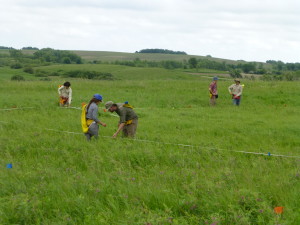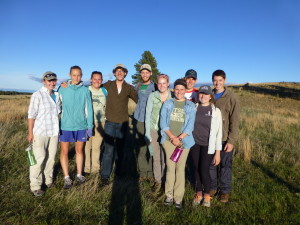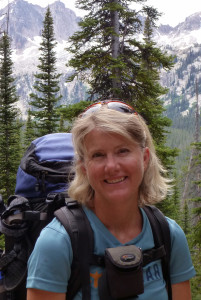Pamela Kittelson
Professor in Biology and Environmental Studies
What classes do you regularly teach?
Principles of Biology (Bio101), Evolution, Ecology and Behavior (Bio202), Plant Physiology and Ecology.
What’s the best advice about teaching you’ve ever received?
They are inter-related: less is more, and focus on quality rather than quantity. The classes I teach are information-rich, and the information changes rapidly as we discover more about how life on this planet operates. While terms and jargon are important, I can’t possibly cover it all. Moreover, the skills they need to distill information now and into the future are more important. Instead of cramming notebooks with facts, I try to focus on teaching big picture concepts in the context of building information literacy, writing, analytic and quantitative skills. These activities take time in class so I focus less on information delivery, and more on quality assignments that have higher order outcomes.
Tell us about your favorite topic or course to teach.
Honestly, I love all the classes I teach for different reasons. In the upper division electives (Plant Phys and Ecology), we can share our enthusiasm for the subjects, and I help them hone skills applicable to their interests and potential as scientists. Plus, I can run more experiential laboratories in the smaller sections. In Bio101, which is often filled with first semester first-year students, I am witness to the incredible growth of my students as learners. In Bio202, I get to meet all the majors, and the class is a mid-level capstone so they begin to integrate major skills they have been introduced to in previous courses (writing, analytic, experimental design, etc). Each course is a favorite because of the unique development that can occur.
Describe a favorite in-class activity or assignment.
For Plant Phys, I like to conduct peer review workshops for at least one writing assignment that has scaffolded components (research, proposal, outline, draft, revision). The students choose topics so they learn about different subjects by reviewing two peers’ papers. Each student turns in a draft to me and two other peers. After reading the drafts, we gather in sequential groups of 4 (me, the writer and the two peers) and we go through each paper focusing on macro-issues: what worked well (or not) structurally, and in terms of building an argument using evidence. Each writer also gets written comments from three people. The students develop into better writers by having the opportunity to go through several cycles of revision on their own paper, and they think more deeply about constructive comments aimed to improve the papers of their peers. They see models of effective and less than effective writing. They develop more confidence in their technical writing and information literacy, and they report enjoying the process of researching and writing. I devote one lab period to the workshop and parts of other classes to the other components. It is a lot of work for me, but the quality of their writing dramatically improves with the practice. This activity was borrowed and modified after several conversations with faculty in English.
I also love anything that takes us into the field.
What teaching and learning techniques work best for you?
I mix it up. Lecture still is effective in the sciences because students need to feel comfortable with terms and they need guidance how to focus on major processes (aka the big picture). However, I find that I am giving more mini-lectures, or flipping lecture and allowing more time in class to practice working with the information. In each class period, I aim to do something other than just talk at them. I incorporate case studies, small group problem sets, demos, discussions, presentations, videos, or investigative labs. I like opportunities to turn the process of learning over to them. Any time we can get out into the field or they can do something with their hands, I jump on it because experiences seem to result in the richest, long-term learning.
Tell us something that you’ve learned about yourself from teaching.
I enjoy talking about teaching with others and hearing about their strategies. I enjoy the process of teaching, but I am uncomfortable talking about how ‘I’ teach, the approaches ‘I’ use, or how anything related to my approach is unique. I am constantly borrowing from others and adapting it.
I do like to teach because it allows me to remain open. While I may have more experiences than students do, I always learn something significant from them.
Three words that best describe your teaching style.
Experiential. Challenging, but fair. #4. Adaptable.
What is your teaching philosophy in 8 words or fewer?
Catalyze curiosity. Balance empathy with high expectations.
 Tell us about a teaching disaster (or embarrassment) you’ve had.
Tell us about a teaching disaster (or embarrassment) you’ve had.
I have taught in a couple of situations where I had no business holding class. I handle stress well and can be self contained, but we all experience upheaval that can be overwhelming. In particular, I tried to hold class after hearing about the death of a family member, while I was also going through a personal crisis. I kept talking, talking, but I was making little sense. I almost started crying. Everything simply spiraled downward. It was an awkward class period that left my students confused and/or uncomfortable. I was the only person that learned something that day; i.e. sometimes it is appropriate to cancel class.
I also try harder to recognize when students may be having an ‘off’ day or when they may be carrying mental or emotional baggage that affects performance in class. I try to be a resource or at the very least, understanding.
What is something your students would be surprised to learn about you?
I am a first generation college student who earned B’s in the sciences and struggled mightily with math classes. My stress dreams still involve taking a calculus exam without: being able to see it, hear it, understand anything b/c I have not attended the course, or because of some other bizarre permutation.
What are you currently reading for pleasure?
I love fiction. I just finished ‘Pictures at an Exhibition’ by Sara Houghteling, and queued up next is the last work of one of my favorite authors, Kent Haruf, ‘Our Souls at Night.’
Who would you like to fill out this survey next?
Becky Fremo, Margaret Bloch Qazi, Jon Grinnell, Amanda Nienow
The How I Teach series asks Gustavus faculty members to share their thoughts on assignments, course activities, and teaching in general. Most Tuesdays a new Gustavus faculty member will be featured. If you have someone you want to see featured, let us know. Also, we’d love it if you’d answer the questions yourself and send those along with a few pictures to howiteach@gustavus.edu.
